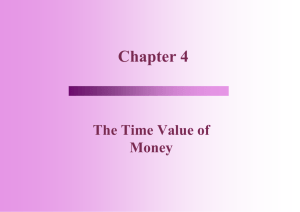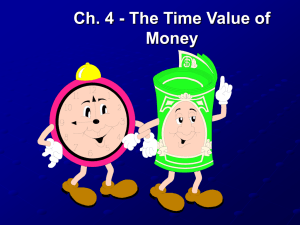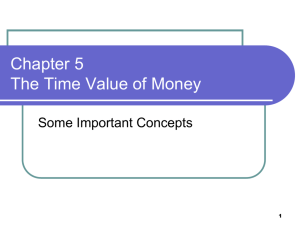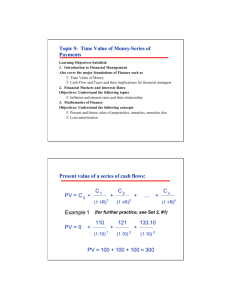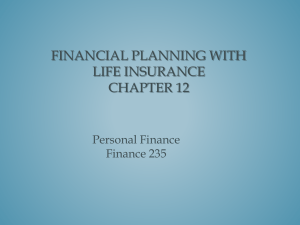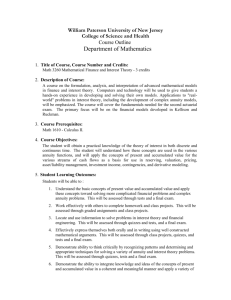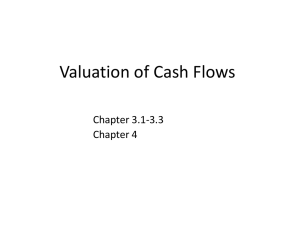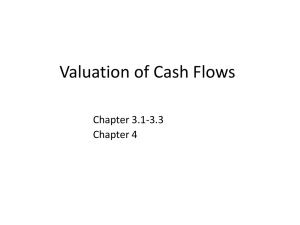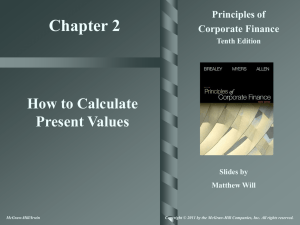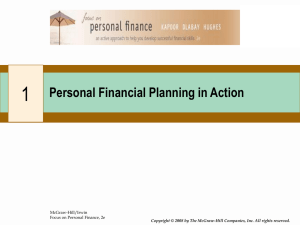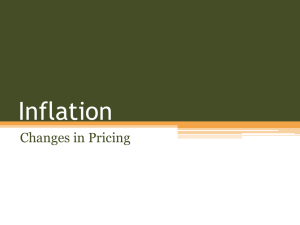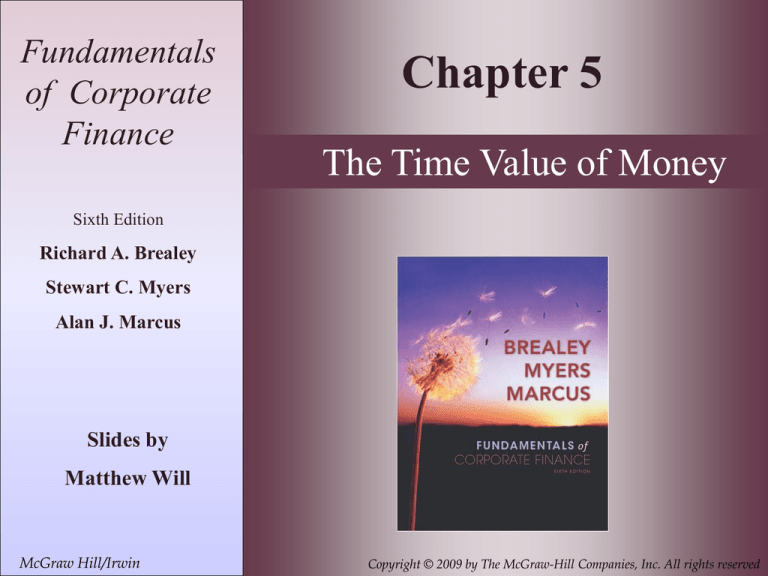
5- 1
Fundamentals
of Corporate
Finance
Chapter 5
The Time Value of Money
Sixth Edition
Richard A. Brealey
Stewart C. Myers
Alan J. Marcus
Slides by
Matthew Will
McGraw
McGraw Hill/Irwin
Hill/Irwin
Copyright ©Copyright
2009 by The
McGraw-Hill
Companies, Inc.
All rights
reserved
© 2009
by The McGraw-Hill
Companies,
Inc.
All rights reserved
5- 2
Topics Covered
Future Values and Compound Interest
Present Values
Multiple Cash Flows
Level Cash Flows Perpetuities and Annuities
Effective Annual Interest Rates
Inflation & Time Value
5- 3
Future Values
Future Value - Amount to which an investment
will grow after earning interest.
Compound Interest - Interest earned on interest.
Simple Interest - Interest earned only on the
original investment.
5- 4
Future Values
Example - Simple Interest
Interest earned at a rate of 6% for five years on a
principal balance of $100.
Interest Earned Per Year = 100 x .06 = $ 6
5- 5
Future Values
Example - Simple Interest
Interest earned at a rate of 6% for five years on a
principal balance of $100.
Today
Interest Earned
Value
100
Future Years
1
2
3
4
6
6
6
6
106 112 118 124
Value at the end of Year 5 = $130
5
6
130
5- 6
Future Values
Example - Compound Interest
Interest earned at a rate of 6% for five years on the
previous year’s balance.
Interest Earned Per Year =Prior Year Balance x .06
5- 7
Future Values
Example - Compound Interest
Interest earned at a rate of 6% for five years on
the previous year’s balance.
Today
Interest Earned
Value
100
Future Years
1
2
3
4
5
6
6.36
6.74
7.15
7.57
106 112.36 119.10 126.25 133.82
Value at the end of Year 5 = $133.82
5- 8
Future Values
Future Value of $100 = FV
FV $100 (1 r )
t
5- 9
Future Values
FV $100 (1 r )
t
Example - FV
What is the future value of $100 if interest is
compounded annually at a rate of 6% for five years?
FV $100 (1 .06 ) $133 .82
5
5- 10
Future Values with Compounding
FV of $100
1800
1600
0%
1400
5%
1200
1000
800
10%
15%
Interest Rates
600
400
200
0
0 1 2 3 4 5 6 7 8 9 10 11 12 13 14 15 16 17 18 19 20
Number of Years
5- 11
Manhattan Island Sale
Peter Minuit bought Manhattan Island for $24 in 1626.
Was this a good deal?
To answer, determine $24 is worth in the year 2008,
compounded at 8%.
FV $24 (1 .08)
$140.63 trillion
382
FYI - The value of Manhattan Island land is
well below this figure.
5- 12
Present Values
Present Value
Discount Factor
Value today of a
future cash
flow.
Present value of
a $1 future
payment.
Discount Rate
Interest rate used
to compute
present values of
future cash flows.
5- 13
Present Values
Present Value = PV
PV =
Future Value after t periods
(1+r)
t
5- 14
Present Values
Example
You just bought a new computer for $3,000. The payment
terms are 2 years same as cash. If you can earn 8% on your
money, how much money should you set aside today in order
to make the payment when due in two years?
PV
3000
2
(1.08 )
$2,572
5- 15
Present Values
Discount Factor = DF = PV of $1
DF
1
(1 r ) t
Discount Factors can be used to compute the
present value of any cash flow.
5- 16
Time Value of Money
(applications)
The PV formula has many applications.
Given any variables in the equation, you can
solve for the remaining variable.
PV FV
1
(1 r ) t
Present Values with Compounding
120
Interest Rates
100
PV of $100
5- 17
0%
5%
80
10%
15%
60
40
20
0
0 1 2 3 4 5 6 7 8 9 10 11 12 13 14 15 16 17 18 19 20
Number of Years
5- 18
Time Value of Money
(applications)
Value of Free Credit
Implied Interest Rates
Internal Rate of Return
Time necessary to accumulate funds
5- 19
PV of Multiple Cash Flows
Example
Your auto dealer gives you the choice to pay $15,500 cash
now, or make three payments: $8,000 now and $4,000 at
the end of the following two years. If your cost of money is
8%, which do you prefer?
Immediate payment 8,000.00
PV1
4 , 000
(1.08 )1
3,703.70
PV2
4 , 000
(1.08 ) 2
3,429.36
T otalPV
$15,133.06
5- 20
Present Values
$8,000
$4,000
$ 4,000
Present Value
Year 0
Year
0
$8,000
4000/1.08
= $3,703.70
4000/1.082
= $3,429.36
Total
= $15,133.06
1
2
5- 21
Perpetuities & Annuities
Finding the present value of multiple cash flows by using a spreadsheet
Time until CF Cash flow Present value
0
8000
$8,000.00
1
4000
$3,703.70
2
4000
$3,429.36
SUM:
Discount rate:
Formula in Column C
=PV($B$11,A4,0,-B4)
=PV($B$11,A5,0,-B5)
=PV($B$11,A6,0,-B6)
$15,133.06 =SUM(C4:C6)
0.08
5- 22
PV of Multiple Cash Flows
PVs can be added together to evaluate
multiple cash flows.
PV
C1
(1 r )
(1 r ) 2 ....
C2
1
5- 23
Perpetuities & Annuities
Perpetuity
A stream of level cash payments
that never ends.
Annuity
Equally spaced level stream of cash
flows for a limited period of time.
5- 24
Perpetuities & Annuities
PV of Perpetuity Formula
PV
C = cash payment
r = interest rate
C
r
5- 25
Perpetuities & Annuities
Example - Perpetuity
In order to create an endowment, which pays
$100,000 per year, forever, how much money must
be set aside today in the rate of interest is 10%?
PV
100 , 000
.10
$1,000,000
5- 26
Perpetuities & Annuities
Example - continued
If the first perpetuity payment will not be received
until three years from today, how much money needs
to be set aside today?
PV
1, 000 , 000
( 1 .10 ) 3
$751,315
5- 27
Perpetuities & Annuities
PV of Annuity Formula
PV C
1
r
1
r ( 1 r ) t
C = cash payment
r = interest rate
t = Number of years cash payment is received
5- 28
Perpetuities & Annuities
PV Annuity Factor (PVAF) - The present value
of $1 a year for each of t years.
PVAF
1
r
1
r ( 1 r ) t
5- 29
Perpetuities & Annuities
Example - Annuity
You are purchasing a car. You are scheduled to
make 3 annual installments of $4,000 per year.
Given a rate of interest of 10%, what is the price you
are paying for the car (i.e. what is the PV)?
PV 4 ,000
1
.10
PV $9,947.41
1
.10 ( 1 .10 ) 3
5- 30
Perpetuities & Annuities
Applications
Value of payments
Implied interest rate for an annuity
Calculation of periodic payments
Mortgage payment
Annual income from an investment payout
Future Value of annual payments
FV C PVAF (1 r )
t
5- 31
Perpetuities & Annuities
Example - Future Value of annual payments
You plan to save $4,000 every year for 20 years and
then retire. Given a 10% rate of interest, what will
be the FV of your retirement account?
FV 4 ,000
1
.10
FV $229,100
1
.10 ( 1 .10 ) 20
(1.10)
20
5- 32
Effective Interest Rates
Effective Annual Interest Rate - Interest rate
that is annualized using compound interest.
Annual Percentage Rate - Interest rate that is
annualized using simple interest.
5- 33
Effective Interest Rates
example
Given a monthly rate of 1%, what is the Effective
Annual Rate(EAR)? What is the Annual Percentage
Rate (APR)?
5- 34
Effective Interest Rates
example
Given a monthly rate of 1%, what is the Effective
Annual Rate(EAR)? What is the Annual Percentage
Rate (APR)?
12
EAR = (1 + .01) - 1 = r
EAR = (1 + .01)12 - 1 = .1268or 12.68%
APR = .01 x 12 = .12 or 12.00%
5- 35
Inflation
Inflation - Rate at which prices as a whole are
increasing.
Nominal Interest Rate - Rate at which money
invested grows.
Real Interest Rate - Rate at which the
purchasing power of an investment increases.
5- 36
Inflation
Annual Inflation, %
Annual U.S. Inflation Rates from 1900 - 2007
5- 37
Inflation
1+ nominal interest rate
1 real interest rate =
1+inflation rate
approximation formula
Real int. rate nominal int. rate - inflation rate
5- 38
Inflation
Example
If the interest rate on one year govt. bonds is 6.0%
and the inflation rate is 2.0%, what is the real
interest rate?
1+.06
1 real interest rate = 1+.02
Savings
1 real interest rate = 1.039
Bond
real interest rate = .039or 3.9%
Approximation = .06 - .02 = .04 or 4.0%
5- 39
Inflation
Remember: Current dollar cash flows must be
discounted by the nominal interest rate; real
cash flows must be discounted by the real
interest rate.
5- 40
Web Resources

